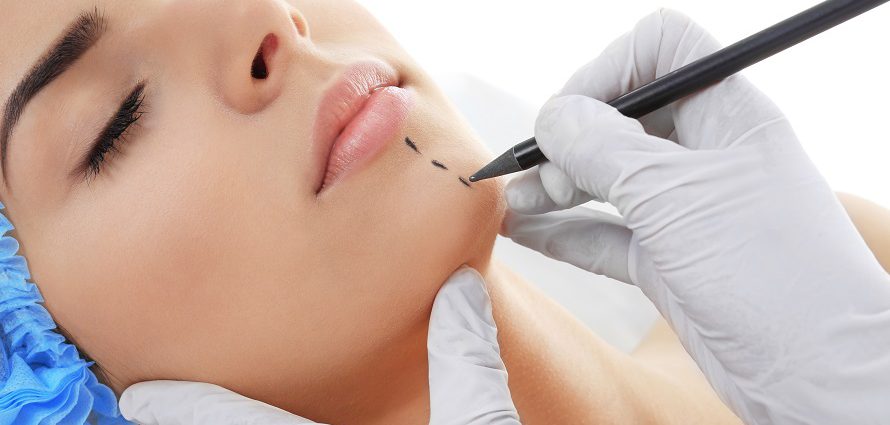Keep Your Chin Up With Chin Implants

Reviewed by Darrick E. Antell, MD
A weak chin may alter your facial appearance. It can also make your perfectly sized nose appear too large, or make your neck look “fleshy.” Chin augmentation with implants — also called mentoplasty — may help.
Chin implants can correct a weak chin, strengthen the appearance of a receding chin or improve the overall appearance of your face and profile by restoring balance.
The implant itself comes in various shapes and sizes. It can be used to fashion a chin that is stronger or wider, and can even make your face appear longer. The chin implant is placed over the existing bone structure of your lower jaw to increase its dimensions and produce your desired result.
In 2008, more than 14,000 chin augmentation surgeries were performed, according to the American Society of Plastic Surgeons.
Are You a Candidate for Chin Implants?
Chin implants can benefit men and women alike; however, not all men and women are candidates for this plastic surgery procedure.
For chin implant surgery to be successful, your jaw and teeth must function properly. If your chin is mildly weak and your jaw and teeth are functioning well, chin implants may be an ideal way to achieve the look you want. It’s also important that your immune system function well to reduce the risk of infection after surgery.
You may have used soft tissue fillers such as Juvederm or Restylane to try to create a stronger chin line, and liked the result. If so, you may be an especially good candidate for a chin implant, which will provide a more permanent, lasting solution.
Preparation for the Chin Augmentation Procedure
You should be well-rested before undergoing chin implant surgery. Focus, too, on eating well and drinking plenty of water in the days or weeks before your surgery.
Depending on the kind of anesthesia you will have — twilight or intravenous — your surgeon may have specific instructions about what not to eat or drink immediately before surgery. You may need someone to drive you home after the procedure. Ask ahead so you can make the appropriate arrangements.
If you are on medication — either over-the-counter (OTC) or prescription — be sure to ask if you should continue taking them or stop before surgery. If you take any herbal supplements, ask about those, too.
The Procedure
You can undergo chin implant surgery by itself, or in combination with other facial surgery procedures such as facelift surgery, blepharoplasty, lip lift, cheek implants or a jaw implant. It can be done in the doctor’s office or an outpatient surgery center.
Your surgeon will choose the right implant shape and size to best fit your anatomy and meet your cosmetic goals. The implants are made of a soft, rubbery, flexible material that can be inserted through a small incision. Chin implants may be composed of solid silicone or other materials that don’t cause adverse reactions within your body.
As an alternative to chin implants, some plastic surgeons may suggest a procedure called sliding genioplasty, or “chin advancement.” This procedure involves cutting the chin bone horizontally and rotating it to make your chin straighter. Sliding genioplasty can also make your chin longer or shorten it vertically.
If your implants are made of solid silicone, your surgeon may make a small incision under your chin. If the chin implantation procedure is performed at the same time as a face lift, your surgeon will generally use the same below-the-chin incision for both procedures. The incision for a sliding genioplasty is made within the lip.
The chin implant is then inserted and secured in place. This can be done by slipping the implant into a well-fitting pocket and possibly attaching it to bone or soft tissue. Most surgeons just use a pocket, while some prefer using screws to attach the implant to bone or soft tissue.
The chin implant procedure is finalized with sutured closure of the incision. In all, the surgery takes approximately 30 to 45 minutes. The procedure will take longer if additional procedures are being performed simultaneously.
Risks of Chin Implant Surgery
As with any surgery, postoperative after effects and potential risks accompany chin implant surgery.
- Your lip area may feel numb, like after a dentist visit, if the incision was made through the mouth. Feeling should return the following day.
- Your chin area will be mildly swollen and sore.
- Sensation to the area may be changed. This may be a temporary or permanent change.
- The implant could shift. To help minimize this possibility, your surgeon will advise you to avoid contact sports until healing is complete. Typically, you should avoid contact to the implant area for four to six weeks.
- An infection may develop as a result of the implant. If that happens, your surgeon may need to remove it and redo the procedure.
Are you the next Bill Gates or Carly Fiorina?
You could be if you undergo chin augmentation. Prominent chins may actually increase a man or woman’s professional status. A leading New York City plastic surgeon conducted a study of the profiles of 42 top CEOs on the Fortune 500 list and found that an overwhelming 94 percent of them had chins that were either average or above average in prominence, compared to the general population.
Why? People equate strong chins with confidence and character and leadership ability, says study author Darrick Antell, MD, who presented these findings at the recent World Congress on Liposuction Surgery and Advances in Cosmetic Surgery in Dubai. In today’s economy, chin implants may help give prospective employees a leg and a chin up over the competition.According to Antell, chin implants give a person a stronger, more forceful appearance, and that can help them secure the job they want. “We know tall, good looking people with a strong chin are more likely to get the job,” he says.
Recovery from Chin Implant Surgery
Chin augmentation recovery time varies based on whether the implant procedure was performed alone or in conjunction with other procedures.
If you had just the chin implant, you should feel fine the day of the surgery, although your surgeon will probably advise you to take it easy. You may have mild soreness in the chin area and some swelling. The chin area may feel tight due to the increased volume provided by the implant, and the body’s swelling response.
If the pain is more than mild, your surgeon may prescribe pain medicine or advise you on OTC painkillers. The pain medicines are usually needed, if at all, for only a few days.
As a preventive step, your surgeon may prescribe an antibiotic to prevent infection.
Your surgeon may advise you to keep your head elevated to minimize the swelling, which is temporary.
Plan to do only light activities the day of the surgery, asking your surgeon for specifics on how and when to resume your usual activities. In general, return to work and other normal activity can occur within a week. If complications such as infection occur, of course, it could take longer.
If the incision was done through the mouth, you may have to eat a bland, soft diet for a few days to give the gums time to heal. You may be told to rinse your mouth after eating to keep debris off the sutures. The sutures in the mouth typically self-dissolve in one or two weeks. Your surgeon may recommend you rinse with salt water, mouth wash or prescription mouthwash following chin surgery.
There will be no visible scarring if the chin implant is placed via an incision in your mouth. There may be a very small scar if the implant is placed via an incision under your chin.
How to Choose a Chin Implant Surgeon
For the best results, you should choose a board-certified plastic surgeon or facial plastic surgeon who has experience in placing chin implants.
Ask to see before-and-after photos of other chin implant patients to help you gauge expectations. You can ask your surgeon how many total chin implant procedures he or she has performed, or how frequently in a week/month this procedure is performed.
Chin Implant Surgery Cost
The cost of chin plastic surgery includes the surgeon’s fee, anesthesia fee, operating room fee and implant fee.
According to 2008 statistics from the American Society of Plastic Surgeons, the national average for plastic surgeon fees for chin implantation was $2,178.
Chin implants are typically considered cosmetic, so the costs are not covered by insurance. However, if you are having the implant done as a reconstructive surgery procedure after trauma to the face, the costs may be covered by your plan. Make sure you check with your insurance provider before agreeing to undergo the procedure. If the plastic surgery cost of the chin augmentation procedure is too high, ask the facility about payment plans and medical finance options.
About the Reviewer of This Article
Darrick E. Antell, MD, is an educational spokesperson for the American Society of Plastic Surgeons. He is a board-certified plastic and reconstructive surgeon who has been in private practice for more than 20 years in New York City. Dr. Antell is a member of the American Society for Aesthetic Plastic Surgery and the American Society of Plastic Surgeons. He is also a Fellow of the American College of Surgeons. Dr. Antell received his general surgery training at Stanford University Medical Center and his specialty training in plastic/reconstructive surgery at the New York Hospital/Cornell Medical Center and the Memorial Sloan-Kettering Cancer Center in New York City.



